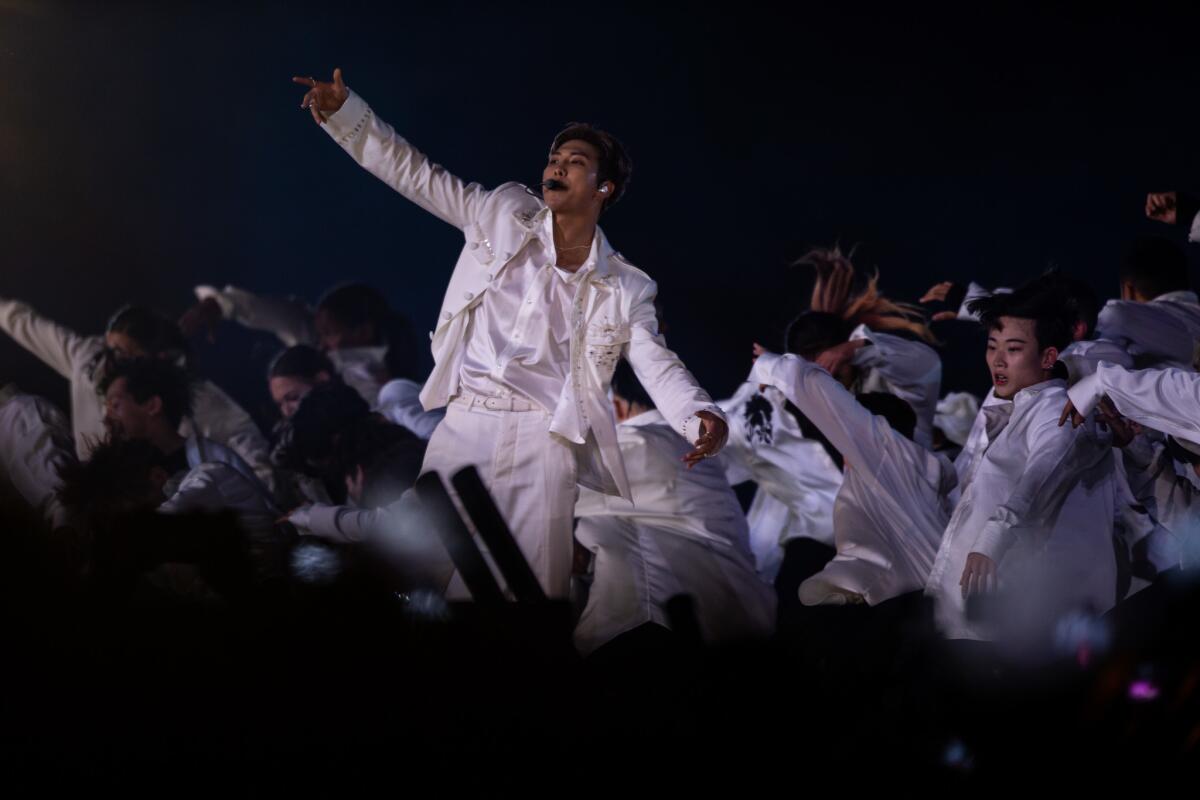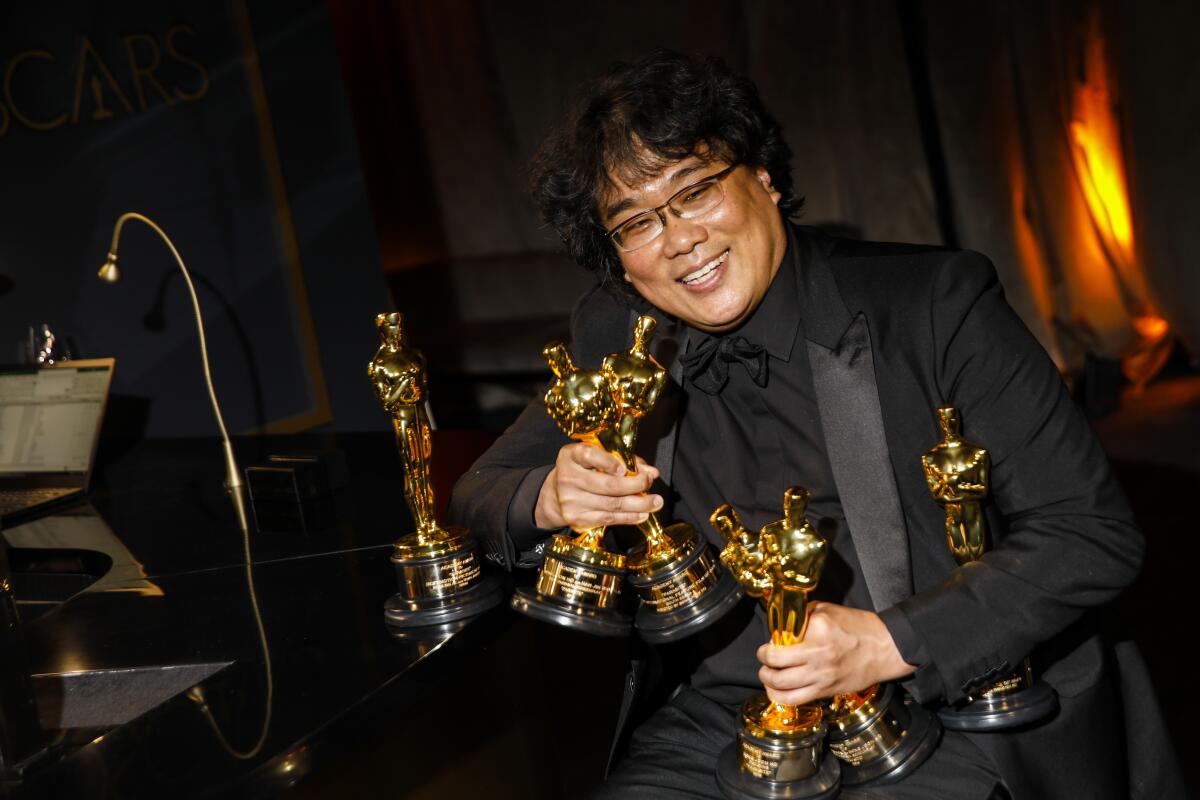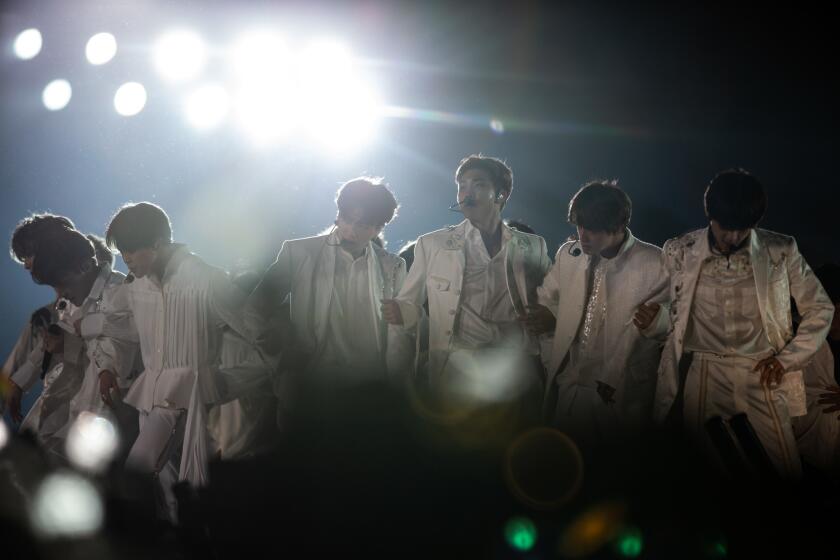Korean culture wave rises high on ‘Parasite’ and BTS. Ride it with novelist Steph Cha

When “Parasite” made cinematic history by winning Academy Awards not just for international film, original screenplay and director but for best picture, I was in the air, flying home to Los Angeles. I landed a couple of hours after the Oscars to a flurry of celebratory texts in the group chat I keep with my best friends. Most of us are Korean American, and we met in middle school in the late 1990s, bonding over our shared heritage — or rather our earnest love for the Korean boy band H.O.T.
We weren’t aware of this at the time, but while we discussed which H.O.T. member was cutest (Kang Ta) and vied for who got to marry him (signing notes passed in class “Mrs. Kang Ta”), we were witnessing the birth of a genre that has since become a global juggernaut. H.O.T. was one of K-pop’s first breakout acts, an early export of what has since become known as the Korean Wave, or hallyu.
In 1997, loving H.O.T. made us little weirdos, teenybopping in a different world from the rest of our classmates. But today’s H.O.T. is BTS, a Korean phenomenon that sells out U.S. stadiums, performed in Times Square as part of Dick Clark’s New Year’s Rockin’ Eve With Ryan Seacrest 2020 and whose new album, “Map of the Soul: 7,” is already breaking sales records since it dropped Friday.
The Korean Wave may be riding at an all-time high, but it’s been building since the late 1990s, thanks to targeted government investment in the entertainment industry, designed to spread Korean pop culture worldwide. It wasn’t just K-pop that came into its own in the ’90s. Korean dramas started becoming wildly popular, and Korea’s new film industry announced itself with 1999’s action thriller “Shiri,” the country’s first Hollywood-style blockbuster, with a then record-breaking budget of $8.5 million.
The wave spread across Asia before reaching a global audience thanks to savvy social networking strategies and a steady stream of media with increasingly high production values. Even President Obama acknowledged the vital force of Korean pop culture during a 2012 speech in Seoul when he said, “People around the world have caught the Korean Wave, Hallyu.”
“Parasite’s” Oscars performance is a new crest in the wave, a stunning sweep at the most significant awards show on this side of the Pacific. It’s a win so strong that it signals yellow peril for our current president, who pined for the good old days when movies for white people got their due — I’m not even talking about “Green Book” here; he went all the way back to Confederate romance “Gone With the Wind.”

Defensive pride
I’ve watched this all happen with a great sense of satisfaction. I grew up in Los Angeles, which is home to the largest ethnically Korean population outside of the major urban centers in Korea, but I’ve always felt like part of this scrappy little minority group with a desire to be known and acknowledged. When I was a kid, my classmates used to ask if I was Chinese or Japanese, and I remember snapping back, with bruised insistence, that I was Korean. This exchange usually went with the slanted-eye nonsense that every Asian kid in America seems to have endured on playgrounds in the 1980s and ’90s. Fingers pulling eyes sideways into slits — horizontally for Chinese, angled up for Japanese. I educated them enough that we settled on assigning Korean eyes a downward slant, earning a proper place for my people in the vocabulary of schoolyard harassment.
If you were hitting “refresh” in the glow of your phone all night, waiting for “Map of the Soul: 7” to drop, BTS has richly rewarded your patience.
No one taught me to do this, or at least I hope they didn’t, but I recognize it now as a natural Korean reflex. A prickly, defensive sort of pride in a heritage riddled with defeat and occupation, getting demeaned and subjugated, imperialized and erased, even as we guarded a sense of wounded nationalist superiority. Maybe this is why Koreans celebrate even stupid things that feel particularly Korean — I’ve heard Koreans brag about avoiding SARS because of kimchi. Anything that we can lay claim to feels like it must be worthwhile, whether it’s high internet speeds, a perfectly phonetic alphabet, or a decadent love of pork and alcohol.
I was in late elementary school when I first delved into Korean pop culture. I had strict parents, so I didn’t get to do much outside of school, but I did go to hagwon — a cram school called Valley Newton where I spent my summer and weekend hours memorizing SAT words. Newton was in a Van Nuys strip mall on Sherman Way, anchored by the HK Market (now the Greenland Market). All of the businesses there were Korean, and they included both a CD store and a video store, where my mother sweetened my compulsory hagwon attendance with regular access to the latest in Korean media. I got mix CDs, likely unauthorized, loaded with the hits of the month; I rented VHS tapes — also possibly bootleg, labeled with white stickers written on in Sharpie — with music videos and dance performances. I started watching variety shows, where my favorite pop idols made regular appearances, and from there, I got into Korean dramas.
There followed a period of a few years when I had a knowledge of Korean pop culture that was deep and current in a way that I’ve never been patient or single-minded enough to replicate in any field as an adult. I had to work for it, with my crummy Korean and my dial-up Y2K-era internet, and I took pride in my expertise. Unfortunately, none of this made me popular or cool.
To be fair, I wasn’t consuming Korean imports because of my highbrow international tastes. In retrospect, I probably sought out Korean pop culture for the very simple reason that it showed me cute Asian boys when mainstream media did not.
What does the current crop of film and TV shows accused of whitewashing Asian roles say about Hollywood’s ongoing diversity crisis?
As an adult, I’ve gotten angry about the underrepresentation of Asian Americans in pop culture, the dearth of desirable Asian American men on screen. But as a teen, I wasn’t thinking in those terms. I only sought what I wanted — to stare at Song Seung-heon as he emoted with his manly eyebrows — looking where I knew I could find it, a scavenger rooting around for nourishment.
Breakthrough
If I’m being honest here, this was not all premium quality content. The dramas frothed with soap and schmaltz and cancer; people were always falling in love with possible blood relatives, then dying gorgeously while they sorted the family trees. As I grew older and more critical, I became less immersed in Korean pop culture, though I continued to watch the occasional movie or drama. My mother — who gives me regular reports on the tragedies and accomplishments of Koreans around the world — has kept me apprised of the big movies, the ones that smash through existing records every couple of years in the still young and evolving film industry.
A few of these have been internationally successful, but I was still shocked and delighted when “Parasite” broke through the way it did, so that non-Korean friends and co-workers were suddenly buzzing about this movie, telling me I had to go see it — not even because I’m Korean, but because the movie was so damn good, they had to talk about it.
When I decided to watch, I didn’t have to rent it from a video store between a Korean cosmetics shop and a Korean grocery; I saw it at Alamo Drafthouse downtown, where I paid $15 for my ticket and drank a salted caramel milkshake. I felt it then, and I felt it the night of the Oscars — a sense of personal well-being as the Korean Wave flowed into the American mainstream.
The next day, I was delighted to learn that Bong Joon Ho and the “Parasite” team had partied at Soban, a Korean restaurant a mile from my house, until 5 in the morning. Bong had apparently become a regular over the past month, a fan of Soban’s banchan and ganjang gaejang, or raw marinated crab. I got to make my small claim on this moment in the diaspora: I was the first person to review Soban on Yelp, and I told Jonathan Gold to go there and try the gaejang, prompting his glowing review back in 2011. I thought about these new Korean heroes slurping raw crab in my city, and my heart swelled with an old pride.
Steph Cha’s most recent novel is “Your House Will Pay” (Ecco).
More to Read
The biggest entertainment stories
Get our big stories about Hollywood, film, television, music, arts, culture and more right in your inbox as soon as they publish.
You may occasionally receive promotional content from the Los Angeles Times.











